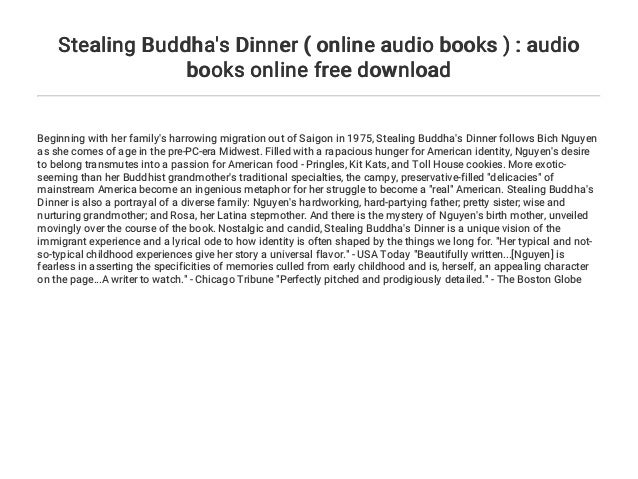

 Stealing Buddha's Melting Pot: The Ambivalence of Assimilation by Ryan B.
Stealing Buddha's Melting Pot: The Ambivalence of Assimilation by Ryan B.
Analyzing Bich's conflicting emotions in response to her immigration to America in Stealing Buddha's Dinner, this essay asserts that Bich struggles with an internal conflict between her aspiration to American culture and her dormant resistance to assimilation. These contradictory desires prove to be more responsible for her alienation than her Vietnamese ethnicity alone.
The Importance of the Stepmother and Grandmother by Caitlin M.
Stealing Buddha's Dinner Nguyen
Stealing Buddha’s Dinner is a memoir by Bich Minh Nguyen that tells the story of her childhood in Grand Rapids, Michigan as a young Vietnamese refugee. Bich’s family, made up of her father; her grandmother, Noi; her sister, Anh; and her uncles, Chu Anh, Chu Cuong, and Chu Dai; flee to the United States from Vietnam in April 1975, just as Saigon is falling to the North Vietnamese. Nostalgic and candid, deeply satisfying and minutely observed, Stealing Buddha's Dinner is a unique vision of the immigrant experience and a lyrical ode to how identity is often shaped by the things we long for. ©2009 Brilliance Audio, Inc.; 2008 Bich Minh Nguyen. More from the same. In the memoir Stealing Buddha’s Dinner, Bich Minh Nguyen explores post-Vietnam war after her family’s migration to the United States through her tale of sorrow and acceptance. Although Bich is separated from her mother when she leaves Vietnam at eight months old, her.
Stealing Buddha's Dinner Discussion Questions
Bich’s grandmother and stepmother, Noi and Rosa, play a prominent role in Bich’s development as a Vietnamese American girl in the 1980s. Rosa influences Bich in terms of education and independence while Noi teaches Bich respect for ancestors and how to be involved in Buddhism. Both women are equally important in shaping Bich.Orphanhood and Alienation by Alyssa B.
This essay attempts to connect Bich Minh Nguyen’s hunger for American cuisine to her hunger for knowledge or information about her biological mother whom they had to leave behind when her family fled from Vietnam. As the memoir proves, the longing for understanding who her mother is is prevalent throughout Stealing Buddha’s Dinner in understanding her own identity.
Stealing Buddha's Dinner
 This essay traces the theme of books within Nguyen’s Stealing Buddha’s Dinner, focusing on their role in her search for an identity that cannot be found within the world she lives in. As books function to separate her from both her Vietnamese and American culture, she is forced to classify with the vast space that exists between the two.
This essay traces the theme of books within Nguyen’s Stealing Buddha’s Dinner, focusing on their role in her search for an identity that cannot be found within the world she lives in. As books function to separate her from both her Vietnamese and American culture, she is forced to classify with the vast space that exists between the two.Family as a Religious Schema by Brianna C.
This essay seeks to explain how Bich Nguyen’s critique of Christianity ultimately rests on a rejection of its people as well as the fact she compares her grandmother’s Buddhist beliefs with the representation of Christianity she is given. Her perception of Christianity stems from an alienation from white people, but it also finds its roots in Bich’s learning to sort through what values are from her home and what is not. Thus, because Christian values are far from her home culture, which she learns to value for herself as she matures, Bich rejects the alienation that she senses in her experiences with Christianity.
Stealing Buddha's Dinner Pdf
Bich Minh Nguyen Starring as Laura Ingalls Wilder: Books Functioning as Self-Othering in Stealing Buddha’s Dinner by Raylene M.
Stealing Buddha's Dinner Summary
In Stealing Buddha’s Dinner, Bich Minh Nguyen uses books to represent self-othering and alienation in her own childhood. Using the example of Laura Ingalls from the Little House In The Prairie book series, who Bich idealized as a child, Nguyen presents to the audience how by trying to connect with these characters further and further made her more alienated from her family. Also, she highlights how by seeking out similarities between herself and the characters she sought to become like them she could not and so othered herself in this way. At the end of the memoir Bich finds resolution in the fact that she will never be just American or just Vietnamese, but always both, and so in a way always other. In this way, books can be seen as the representation of Bich’s alienation and self-othering in her younger years, and can even foreshadow the resolution she will find later on in life.